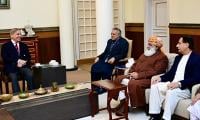ISLAMABAD: First 100 days of Pakistan Tehreek-e-Insaf (PTI) government were supposed to show the direction of the governance for the next five years.
However, government remained mired in number of controversies and scandals during this time. Here is a list of 19 major issues that put the government in spot of bother so far. After winning the elections, Prime Minister Imran Khan was greeted by world leaders, a normal practice in international diplomacy. However two of these calls attracted controversies.
Days later a TV journalist tweeted that Prime Minister Imran Khan refused to take a call from French President Emmanuel Macron, since he was busy meeting some TV anchors and journalists. The government was criticised severely by opposition for not taking foreign relations seriously.
In early September, a reputed UK paper ‘The Financial Times’ claimed that Pakistan was mulling over a review of the CPEC agreement with China, citing Islamabad’s unease with what it claims was unjust benefit being enjoyed by Beijing-owned companies. The paper quoted Prime Minister Imran Khan’s Adviser on Commerce, Textiles, Industries and Investment, Abdul Razak Dawood, as saying that for the time being, all CPEC-related projects must be halted for a year. Dawood distanced himself from the report saying that his statement was taken out of context. But it generated huge controversy for the government and invited strong criticism from the opposition.
Just 16 days after taking oath as Adviser to the Prime Minister on Parliamentary Affairs, Dr Babar Awan, had to resign after filing of a corruption reference against him by the National Accountability Bureau (NAB) for his alleged involvement in inordinate delay in construction of the 525MW Nandipur power plan.
Minister for Science and Technology Azam Swati became centre of controversy after abrupt transfer of Islamabad IGP Jan Muhammad in October over his failure to take calls from the minister. Although the minister denied any role in his transfer, the Supreme Court took a suo motu notice of the case and formed a Joint Investigation Team to probe allegations against Swati. The JIT has found Swati guilty of encroachment on government land outside his farmhouse in Islamabad and using his influence on police to get his poor neighbours including women and children arrested for an alleged trespassing of their cow and subsequent brawl between the minister’s guards and the family outside his farmhouse.
Just days after the prime minister took oath of his office, Rizwan Gondal, a District Police Officer in Pakpattan was transferred abruptly for failing to apologise to Khawar Maneka, the first lady’s former husband. Later in October a damning inquiry report, prepared on the orders of the Supreme Court, held Punjab Chief Minister Usman Buzdar responsible for exerting undue influence to transfer Rizwan Gondal. The chief minister had earlier denied any interference. PTI government was criticised for failing to uphold merit in postings and transfers.
A few weeks after PTI came into power with the promise of non-interference in civil service, the Deputy Commissioners of Chakwal and Rajanpur accused the lawmakers of the ruling PTI of interfering in postings and transfers of patwaris and revenue officials in their respective districts. However instead of appreciating the bureaucrats for speaking up against political meddling, both were issued show-cause notices for “violating the chain of command”.
A senior Railway official was removed from his post after he expressed his reluctance to work under Railway Minister Sheikh Rashid. Muhammad Hanif Gul, a grade-20 officer, was serving as Chief Commercial Manager in Railways. The officer had complained that the minister humiliated his seniors - for not criticising the previous government - in his first meeting after assuming the charge of minister. In his application letter, which has been circulated on social media, Hanif Gul said he finds it impossible to work with Railway Minister, calling him “non-professional and ill-mannered.”
The PTI government appointed a Princeton University economist Atif R Mian in the Economic Advisory Council soon after coming into power. However the religious parties criticised the move as Atif was a member of minority Ahmdiya community. After initial refusal to remove him, the government finally removed him under immense pressure. After Mian’s removal, two more members of the Council resigned in protest creating huge global controversy for the government.
In mid-September, the prime minister initially pledges to grant citizenship to the Afghan and Bengali refugees born in Pakistan. However after a backlash from opposition parties based in Sindh, he backtracked and told Parliament that no decision has yet been taken.
Former KP IGP, Nasir Durrani, a reputed officer, was brought to Punjab to reform the provincial police. But the senior officer heading the police reforms commission, resigned reportedly after abrupt removal of Punjab IGP Mahmood Tahir, only a month after he had assumed the post. There has been no replacement for Durrani to date.
The firebrand Information Minister Fawad Chauhdry’s entry was banned in the Senate after his repeated tirades against the opposition lawmakers. The minister called the rival parliamentarians “dacoits” who squandered public finances. Thereafter, begins a back and forth between the opposition and the information minister which carried on for weeks until the minister was banned by Senate Chairman Sadiq Sanjrani. In October, PTI parliamentarian, Karamat Ali Khokhar, was reprimanded by the Supreme Court for attempting to prevent the arrest of a notorious land grabber, Mansha Bomb.
On November 14, a senior police officer, Tahir Dawar was kidnapped from the capital. However, a probe committee is formed two weeks later, after he is killed in Afghanistan. Not only the government failed to prevent his kidnapping from highly secured “safe city” of Islamabad but a statement by the Special Assistant to Prime Minister on Media Iftikhar Durrani caused huge embarrassment for the government. Durrani had claimed while talking to Voice of America (VOA) that Tahir was safe in Peshawar and his kidnapping was a fake news. To date the government is unable to track his killers.
The PTI government which came into power with promise of transparency and accountability disbanded Ehtesab Commission of Khyber Pakhtunkhwa within its first 100 days. A day later the Minister for Railways Sheikh Rashid closed all vigilance cells in his department that were meant to stop corruption within the department calling them useless.
State Minister for Interior Shehryar Khan Afridi who was earlier criticised for visiting Azam Swati’s farmhouse soon after Swati’s guard had a fight with the poor family from Bajaur is again in trouble for speaking against Saudi Arabia in a meeting with President International Islamic University, Islamabad Dr Ahmed Yousif Al-Draiweesh. The minister was reportedly reprimanded by the party leadership for using undiplomatic language with a Saudi national and uploading the conversation on his social media page.
Before leaving for Saudi Arabia on October 22, PM Khan reportedly told the foreign media that Pakistan is “desperate for money”. The comments caused a storm. PTI ministers then denied that permission for an interview were granted to foreign reporters.
The Supreme Court accepted a petition challenging the appointment of Imran Khan’s close aid, Zulfikar Bukhari, as the special assistant to the PM, due to his dual nationality.
A video has recently surfaced showing PML-Q ministers pleading with PTI senior leader, Jahangir K Tareen to restrain Punjab’s governor from interfering in the administrative work of the province. The PML-Q and PTI are coalition partners.
Prime Minister Imran Khan is at the receiving end of much flak, after he is quoted using fascist leaders, Adolf Hitter and Napoleon Bonaparte, as examples to justify his constant U-turns on issues.
Justice Abdul Shakoor Paracha fixes hearing on December 24 regarding Islamabad constituencies
Police made one arrest after vehicle drove “at least 400 metres across the Christmas market”
Incident occurred when couple, along with their child, was travelling in their car
Congress party dismisses incident as political gimmick
"I am sure once negotiations start, things will move forward," says NA speaker
Discussion focuses on enhancing governance, accountability and functional autonomy within police







